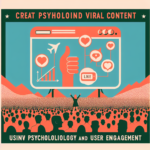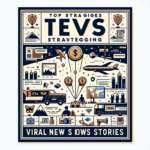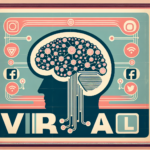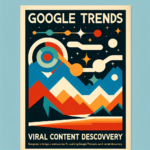Sure, here is the modified content:
An Overview of How AI is Revolutionizing Marketing
Do you know what is transforming the world of marketing as we know it? The answer is Artificial Intelligence (AI). This technology brings a new level of precision, efficiency, and potential for innovation. By using AI, we can gain deeper insights into customer behaviors, create precise personalized content, and optimize ad campaigns.
In this article, we will explore how AI is helping to streamline customer segmentation processes, enhancing content creation, and optimizing advertising budgets. In addition, we’ll examine its impact on social media monitoring, chatbots and customer service, influencer marketing, marketing measurement, marketing research, and even viral marketing. So, are you ready to explore the transforming world of AI-driven marketing?
How AI Will Improve Marketing
Streamlining Customer Segmentation
AI enhances customer segmentation by analyzing vast amounts of data quickly. This ability allows marketers to gain deeper insights into customer preferences and behaviors. Through AI:
- Marketers can segment audiences more accurately.
- Campaigns can be tailored to specific customer needs.
- Real-time data processing is possible, leading to timely adjustments.
Personalized Content Creation
With AI, creating personalized content becomes more efficient. Algorithms can analyze user interaction data and help develop content that resonates with target audiences. Benefits include:
- Improved engagement rates through tailored messaging.
- Automated content generation based on user preferences.
- Enhanced user experience by providing relevant content.
Optimizing Advertising Spend
AI can greatly enhance the efficiency of advertising budgets. It can determine which ads to display, to whom, and when, all in real time. Advantages are:
- Reduced ad spend by targeting only high-potential leads.
- Improved ad performance tracking and analysis.
- Faster decision-making with predictive analytics.
| Task | Traditional Method | AI-Powered Method |
|---|---|---|
| Ad Targeting | Demographics-based | Behavior-based, real-time |
| Content Creation | Manual crafting | Automated personalization |
Enhancing Predictive Analytics
AI boosts predictive analytics by identifying patterns and trends that humans might overlook. This creates opportunities for:
- Anticipating customer needs before they surface.
- Refining product recommendations and upselling strategies.
- Increasing conversion rates through data-driven insights.
For marketers looking to leverage AI, companies like Forbes discuss real-world applications and advancements in AI technology.
AI’s Impact on Social Media Monitoring
Intelligent Monitoring of Social Channels
The advent of AI is revolutionizing social media monitoring and provides a new level of precision and efficiency. AI can scan multiple social channels simultaneously and rapidly analyze large volumes of data, including comments, posts, and shares. Key improvements brought by AI include:
- Robust real-time social media monitoring.
- Automated sentiment analysis for quantifying brand reputation.
- Identifying trending topics and consumer preferences quickly and accurately.
AI’s Role in Chatbots and Customer Service
Conversational AI for Superior Customer Interactions
Artificial Intelligence has been pivotal in shaping the landscape of customer service by enabling the use of chatbots. Intelligent chatbots can handle customer queries instantly, around the clock, thus providing a seamless experience. Additionally:
- Chatbots can handle repetitive tasks, freeing up human agents to tackle more complex issues.
- These AI-powered bots can learn from past interactions, enhancing their response quality over time.
- Personalized interactions can lead to increased customer satisfaction.
AI’s Contribution to Influencer Marketing
Unearthing Influential Personalities with AI
AI helps in identifying influential individuals who can provide significant value to marketing efforts. By analyzing social media data, AI can determine the potential reach and impact of an influencer. Aspects impacted by AI include:
- Finding influencers who align with the brand’s image and values.
- Quantifying an influencer’s impact on brand visibility, engagement, and conversions.
- Predicting the success of potential influence partnerships based on data.
In the rapidly evolving world of digital marketing, Adweek highlights the innovative ways AI is changing the game.
AI-Driven Marketing Measurements
Metrics that Matter: Driven by AI
AI plays an integral role in accurately measuring marketing outcomes. It provides valuable insights into which metrics to track, ties them back to business results, and suggests adjustments for optimization. Key takeaways from AI-driven metrics include:
- Identifying key marketing metrics and KPIs based on business objectives.
- Providing granular insights into marketing performance at the campaign, channel, or user level.
- Making data-driven decisions to optimize marketing efforts and maximize ROI.
Benefits of Artificial Intelligence in Marketing Research
Faster Data Collection and Analysis
AI significantly accelerates the data collection process, which is essential in marketing research. Traditionally, gathering and analyzing large sets of data would take substantial time and manpower. AI offers:
- Rapid data collection from diverse sources.
- Real-time analysis and reporting for timely insights.
- Reduced labor costs by automating complex data tasks.
Enhanced Consumer Insights
Through advanced algorithms, AI provides marketers with a deeper understanding of consumer behaviors and preferences. Its capabilities in this area include:
- Identifying subtle trends and patterns that may not be apparent manually.
- Predicting future consumer behavior based on past interactions.
- Facilitating a more nuanced approach to consumer targeting.
Improved Product Development
AI assists in the product development phase by streamlining research processes and offering predictive analytics. It supports innovation in the following ways:
- Identifying consumer needs before they arise to inspire new product ideas.
- Simulating market scenarios to assess potential product success.
- Gathering feedback rapidly to refine product features according to consumer desires.
Reducing Survey Fatigue
Marketing research often involves surveys, which can lead to respondent fatigue. AI helps mitigate this problem by:
- Creating shorter, more engaging surveys using natural language processing.
- Analyzing survey responses to ensure questions evolve according to trends.
- Segmenting respondents to tailor survey topics to individual interests and maintain engagement.
Integration with Predictive Tools
AI’s integration with predictive tools makes it a powerful ally in foresight management. It aids in:
- Forecasting sales trends and assisting in inventory management.
- Adjusting marketing strategies in anticipation of market shifts.
- Determining the most effective channels and messages for reaching target audiences.
These applications show how AI enhances marketing research by boosting efficiency, improving accuracy, and providing deeper insights. More on how AI transforms marketing can be read on platforms like Marketing Dive.
AI-Powered Analytics in Viral Marketing
Intelligent Trend Analysis
AI can thoroughly analyze and predict trends, which is critical for viral marketing campaigns. By assessing vast amounts of online data, AI tools can spot emerging trends before they become mainstream, giving marketers an edge.
- Identify upcoming trends through pattern recognition.
- Capitalize on trends early to maximize reach and engagement.
- Use sentiment analysis to gauge public interest in real-time.
Audience Behavior Forecasting
AI examines consumer behaviors to forecast future actions, a crucial aspect of creating content that could go viral.
- Highlight potential virality factors based on past successful campaigns.
- Segment consumers more precisely using predictive behavior models.
- Adjust content strategy according to anticipated audience reactions.
Automating Campaign Adjustments
AI-driven analytics enables marketers to automate adjustments to viral campaigns, ensuring they remain effective throughout their lifecycle.
- Implement real-time content tweaks to maintain campaign relevance.
- Automatically redistribute advertising spend to high-impact channels.
- Scale up successful elements quickly for wider reach.
Enhancing Engagement Through AI
AI can significantly boost engagement rates, a key factor for viral marketing success, by targeting the right audience with compelling content.
- Optimize timing and platform choice for posting via engagement data.
- Incorporate feedback loops to adapt content based on user interactions.
- Leverage AI to craft personalized messages that resonate with individual users.
AI-Driven Viral Content Creation
AI assists marketers in creating content that resonates on a viral scale, leveraging advanced tools to ensure impactful storytelling.
- Utilize AI to generate creative ideas and content themes.
- Identify content elements that have historically gone viral.
- Use natural language processing to tailor content to audience preferences.
Incorporating AI into viral marketing strategies can transform how campaigns are designed and deployed, giving businesses a powerful tool to enhance their digital presence. More insights can be found on Forbes.
Conclusion
To summarize, Artificial Intelligence (AI) plays a transformative role in marketing by streamlining customer segmentation, enhancing personalized content creation, optimizing ad spending, refining predictive analytics, and pioneering social media monitoring. It also excels in improving customer service through chatbots, enhancing influencer marketing, driving marketing measurements, accelerating marketing research, and reinventing viral marketing. Indeed, the adoption of AI in marketing amplifies efficiency, boosts accuracy, and provides in-depth, actionable insights that are both timely and relevant in the ever-evolving digital marketing landscape.
Frequently Asked Questions – FAQs
How does AI enhance customer segmentation in marketing?
AI enhances customer segmentation by analyzing vast amounts of data quickly, allowing marketers to gain deeper insights into customer preferences and behaviors. This allows for more accurate audience segmentation and targeted campaigns.
How does AI contribute to personalized content creation?
AI algorithms analyze user interaction data and help develop content that resonates with target audiences. This leads to improved engagement rates, automated content generation based on user preferences, and enhanced user experience.
What is the role of AI in optimizing advertising spend?
AI can determine which ads to display, to whom, and when, all in real time, thereby reducing ad spend by targeting only high-potential leads, improving ad performance tracking and analysis, and enabling faster decision-making with predictive analytics.
How does AI assist in marketing research?
AI accelerates data collection and analysis in marketing research, offers better consumer insights using advanced algorithms, and aids in the product development phase. It even helps in surmounting survey fatigue by creating shorter, more engaging surveys.
How does AI contribute to viral marketing?
AI tools can identify and predict upcoming trends, forecast audience behavior, automate adjustments to campaigns, boost engagement rates, and assist in the creation of content that resonates on a viral scale. These capabilities greatly enhance the success of viral marketing campaigns.






